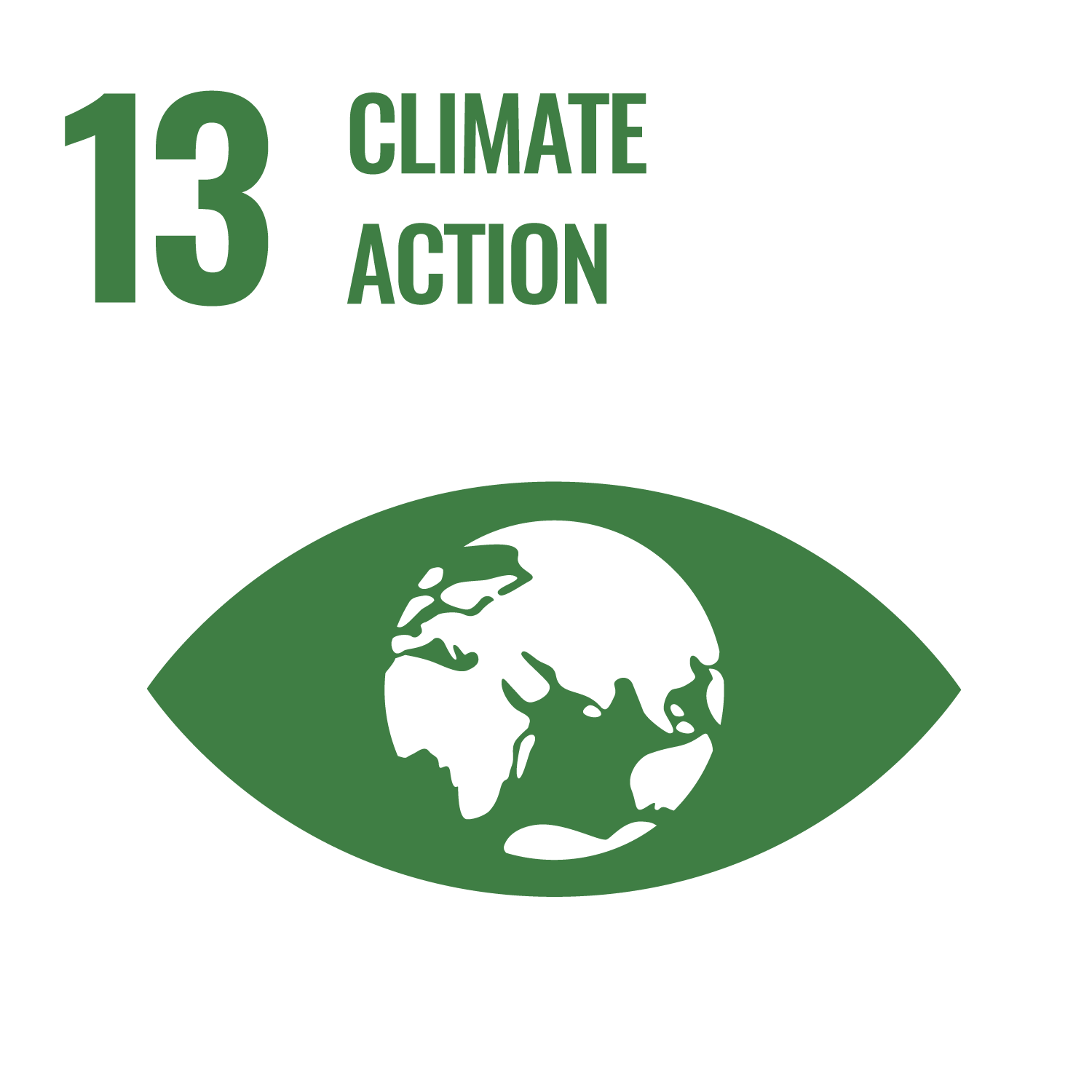 Goal 13. Climate Action
Goal 13. Climate Action
13.3.2 Climate Action Plan, shared
2023-2024
AASTMT’s shared climate action plan emphasizes CO₂ emissions, greenhouse gas reduction, and mitigation pathways to counter global warming and climate change. Through such a framework, AASTMT aligns institutional operations with regional efforts to monitor, model, and manage CO₂ emissions and greenhouse gas impacts in a changing global climate. It integrates strategies for reducing its carbon footprint, promoting low-carbon energy, and facilitating climate adaptation in collaboration with local governments and communities. The plan supports climate resilience, emissions reduction, and participatory climate governance
AASTMT Climate Action Plan_2024:
The Arab Academy for Science, Technology and Maritime Transport (AASTMT) launched its Climate Action Plan 2024 as a comprehensive roadmap to achieve. The plan focuses on reducing greenhouse gas (GHG) emissions, lowering the carbon footprint of campus operations, and promoting climate change mitigation and adaptation strategies across all branches. Key priorities include implementing renewable energy systems, advancing energy efficiency initiatives, integrating climate resilience into campus infrastructure. The plan also supports climate-smart innovation, CO₂ emission tracking, and environmental impact assessment.
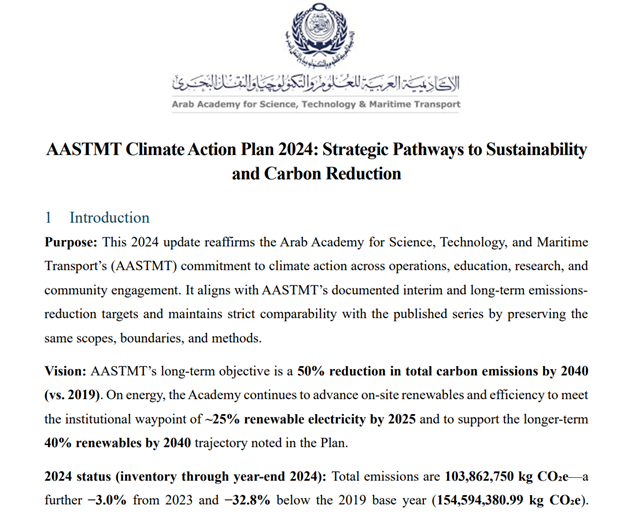
AASTMT Carbon Emissions Reduction and Sustainability Progress Report (2024):
This report, presents AASTMT’s progress through 2024 towards reducing its carbon footprint and advancing sustainability goals. It tracks performance under Scopes 1, 2, and select Scope 3 emissions, benchmarked against prior baselines (2018–2021, 2022–2023), and aligns with the university’s Climate Action Plan targets—≥ 30% reduction by 2025 and 50% by 2040. The document outlines key drivers of change, including renewable energy expansion, energy efficiency upgrades, waste management, procurement practices, and climate education. In 2024, AASTMT achieved a −3.0% reduction in total emissions from 2023 and −32.8% relative to the 2019 baseline, demonstrating sustained decarbonization momentum and strategic alignment with broader climate action and sustainability objectives.
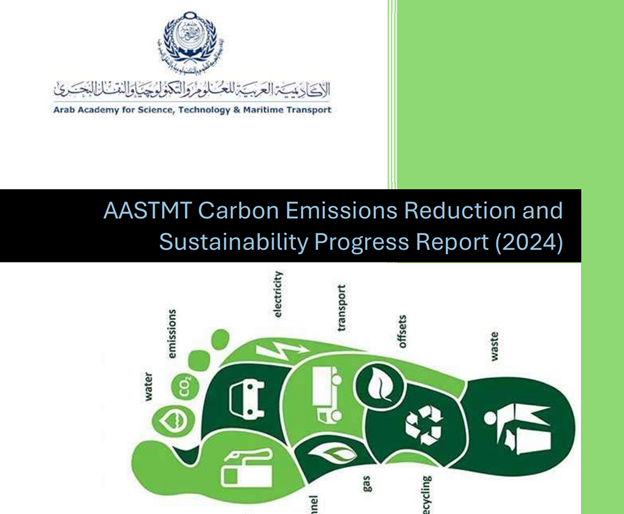
AASTMT “Towards Egypt’s Energy Vision 2030” Workshop (12 February 2024):
The workshop was co-organized by AASTMT and national stakeholders, showing the Climate Action Plan is shared with local/national authorities (e.g., ministries, energy bodies). The event directly addressed decarbonization, electrification, and access, aligning with climate change mitigation, CO₂ reduction, and emission management — all core to SDG 13. Discussion of the Water–Energy–Food–Ecosystem (WEFE) nexus shows integration of land management, energy, and climate adaptation, which demonstrates cross-sectoral climate planning. The event was hosted at AASTMT and involved academic, government, and community stakeholders, proving the plan is not internal-only but shared with public and governmental partners.
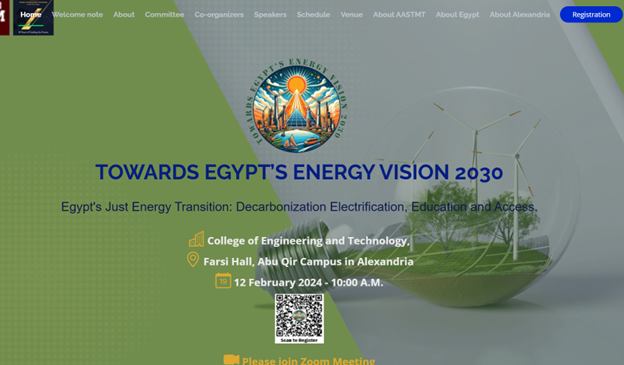
AASTMT Participation in the World Cities Day 2024 celebration:
On October 1, 2024, AASTMT participated in the World Cities Day 2024 celebration, emphasizing the importance of climate resilience, sustainable urban development, and carbon reduction strategies. The event brought together representatives from local government, community organizations, and academia to discuss climate change adaptation, environmental sustainability, and the transition toward low-carbon, climate-smart cities. AASTMT’s participation reflects its commitment to collaborative climate action, emission mitigation, and capacity-building in alignment with SDG 13 (Climate Action) and SDG 11 (Sustainable Cities and Communities).
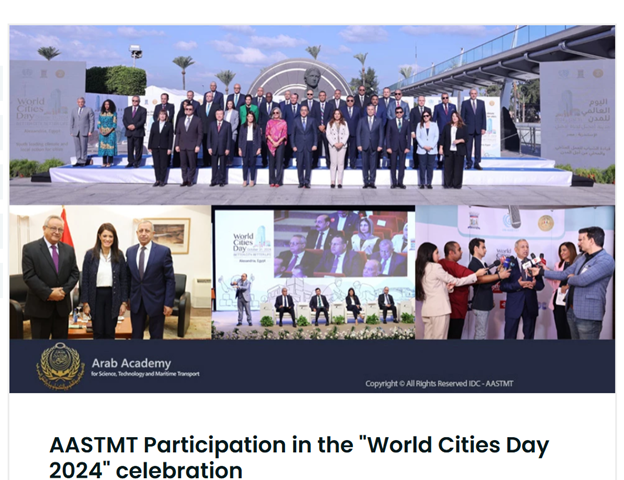
Wetskills–Egypt 2024: Water Innovation and Climate Adaptation:
The Wetskills–Egypt 2024 program united young professionals and students from Egypt, the MENA region, and the Netherlands to develop innovative climate and water solutions that advance climate action and environmental sustainability. Organized by the Wetskills Foundation in partnership with the Arab Academy for Science, Technology & Maritime Transport (AASTMT), the Egyptian Ministry of Water Resources and Irrigation, and the Embassy of the Kingdom of the Netherlands, the event supported the transition toward low-carbon development, CO₂-emission reduction, and climate-resilient water and land systems.
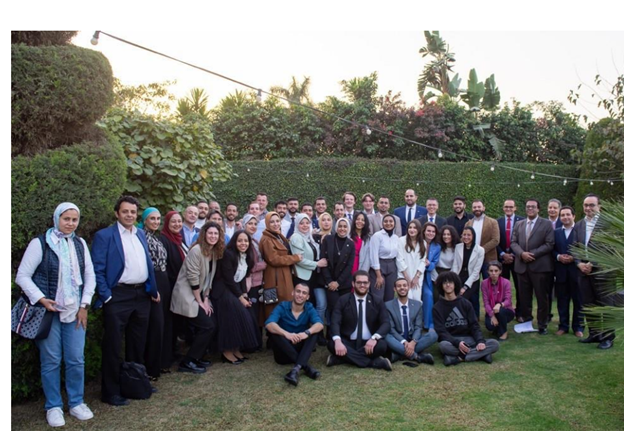
International workshop — “Green Environment and Green Tourism” (World Environment Day activities):
June 2024 — Workshop focused on the role of green tourism in protecting the environment and promoting sustainability (educational/outreach content). Directly addresses green tourism, links tourism with environment protection (education/outreach). AASTMT, through collaborations with the German University of Rostock (TouMaLi Project), Life Makers Foundation (UniGreen Project), and partners from Cyprus and Greece (Green Med Project), shows outreach and shared agenda.
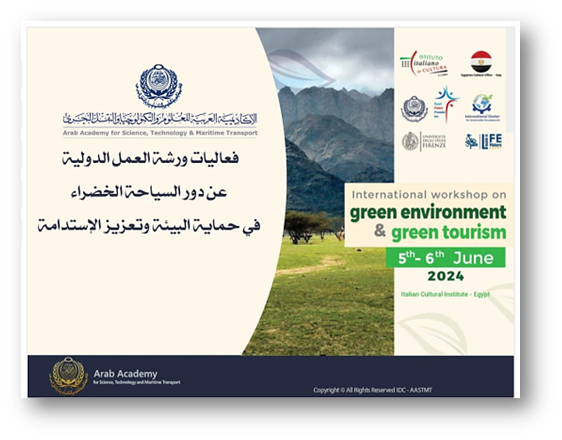
AASTMT Participates in High Institute of Public Health Seminar on Facing Climate Change: Challenges and Solutions for a Sustainable Future:
AASTMT participated in the High Institute of Public Health Seminar titled “Facing Climate Change: Challenges and Solutions for a Sustainable Future.” The event, held in late 2023 and continuing its outreach impact into 2024, focused on climate change education, policy dialogue, and community awareness. AASTMT’s contribution emphasized adaptation strategies, carbon reduction, and sustainable development practices, engaging students, researchers, and local stakeholders in climate resilience discussions — directly supporting SDG 13 (Climate Action) through education, outreach, and mitigation awareness.
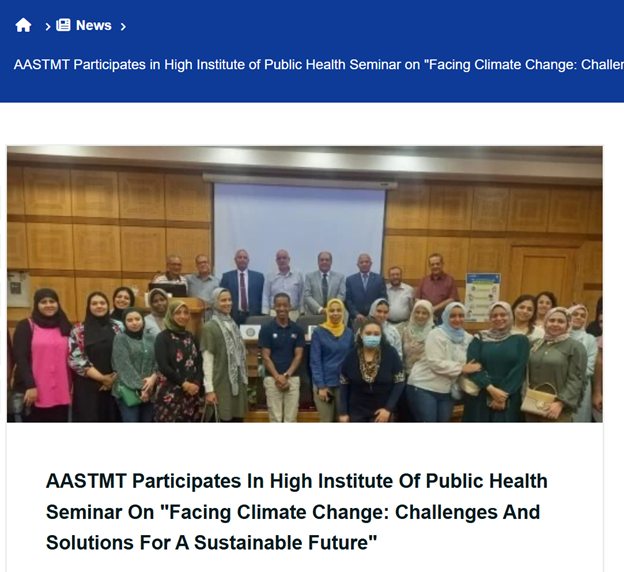
INVOLVE Project Integration of Sustainable Development Goals in Universities for Better Climate Change Management:
The INVOLVE Project aims to integrate sustainability and climate change management practices across universities in the Mediterranean region. AASTMT’s role includes ecosystem-based climate adaptation and biodiversity conservation strategies as part of land and resource management education. The INVOLVE Project aims to integrate sustainability and climate change management practices across universities in the Mediterranean region. AASTMT’s role includes ecosystem-based climate adaptation and biodiversity conservation strategies as part of land and resource management education.
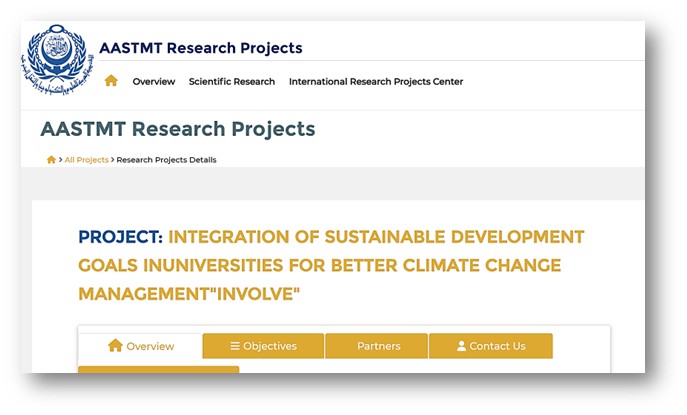
AASTMT INVOLVE Project Overview
AASTMT has a cooperation agreement with the UN ISDR /International Strategy for Disaster Reduction (ISDR):
AASTMT demonstrates regional leadership in climate change adaptation and disaster risk reduction through its cooperation with the United Nations International Strategy for Disaster Reduction (UN ISDR). AASTMT hosts the Regional Bureau for West Asia and North Africa (WANA) and operates a regional database for disaster risk reduction, supporting Arab states in climate resilience and adaptation. This aligns with the shared objectives of a Climate Action Plan under SDG 13.3.2, particularly in regional government collaboration and data-driven risk management.

2022/2023
AASTMT actively maintains and shares its Climate Action Plan with local government entities and community groups. This comprehensive plan emphasizes CO2 emissions reduction, mitigation strategies, and climate adaptation measures. By fostering collaboration with local stakeholders, AASTMT promotes public engagement in addressing global warming, reducing greenhouse gases, and enhancing resilience to climate change impacts. Through workshops, campaigns, and cooperative initiatives, the plan ensures wide-reaching dissemination of climate-focused knowledge, fostering a culture of sustainability across the region.
AASTMT Launches Climate Action Plan to Promote Resilience, Climate Education, and Community Engagement
AASTMT's Climate Action Plan is a comprehensive framework designed to combat climate change by fostering resilience, promoting climate education, and engaging the community. This plan is actively shared with local governments and community groups, facilitating collaborations to address global warming, reducing CO2 emissions, and promote sustainable practices. Through workshops, public events, and collaborative projects, the plan encourages public involvement in climate adaptation and mitigation strategies, emphasizing greenhouse gas reduction and environmental sustainability. This initiative underscores AASTMT's commitment to fostering a climate-resilient society.
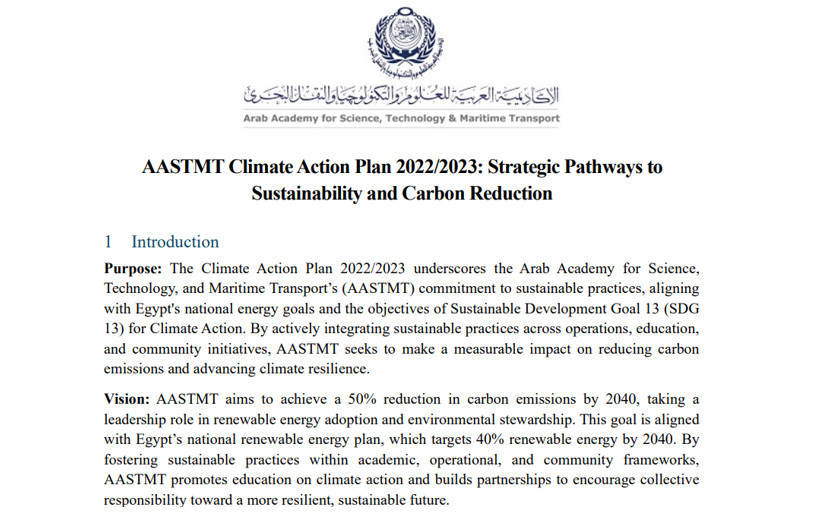
AASTMT’s 2022-2023 Carbon Emissions Report Outlines Path to Carbon Neutrality and Public Climate Action
AASTMT’s 2022-2023 Carbon Emissions Report highlights its proactive efforts to achieve carbon neutrality and enhance public climate action. By sharing its Climate Action Plan with local governments and community groups, AASTMT facilitates collaborative initiatives such as tree planting, sustainability workshops, and emissions reduction campaigns. These efforts aim to raise public awareness about climate change, promote CO2 reduction, and foster community-driven solutions for environmental sustainability, demonstrating AASTMT’s commitment to climate resilience and shared responsibility in combating global warming.

Learn more about the Climate Change Seminar here.
AASTMT Students and Faculty Explore Sustainable Development and Climate Resilience at CEDARE
AASTMT facilitated a visit for students and faculty to CEDARE to explore sustainable development and climate resilience initiatives, reflecting the university's commitment to engaging the community in climate action. This collaboration aligns with AASTMT’s Climate Action Plan, which is shared with local governments and community groups to foster awareness of climate change impacts, CO2 emissions reduction, and adaptation strategies. By participating in discussions on water resource management, sustainable urban planning, and climate adaptation measures, AASTMT reinforces its role in advancing public engagement and education on climate resilience.
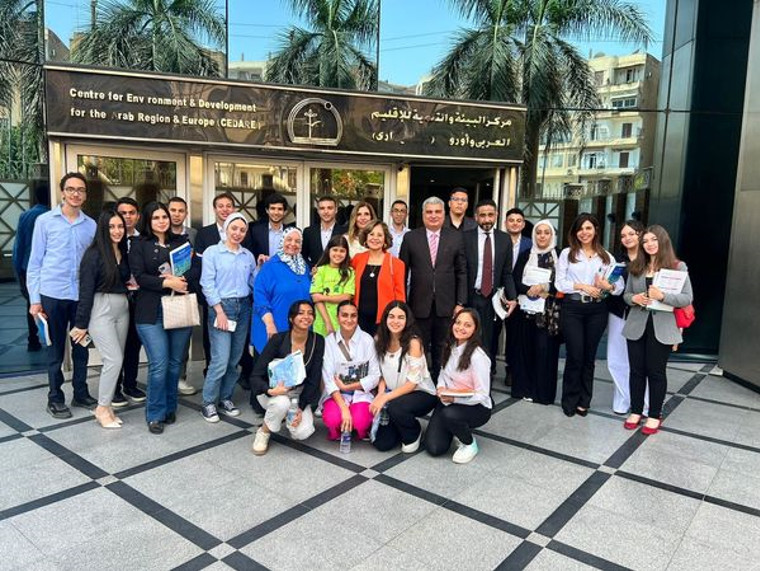
Learn more about the AASTMT Students visit to CEDARE here.
AASTMT Participates in SECAPs Conference in Alicante to Promote Sustainable Energy and Climate Action
AASTMT actively participated in the SECAPs Conference in Alicante, emphasizing its role in promoting sustainable energy solutions and climate resilience. This event aligns with AASTMT’s Climate Action Plan, which is shared with local governments and community groups to foster awareness and collaboration on renewable energy adoption, CO2 reduction, and emissions mitigation. Through discussions on energy transition and community-based climate adaptation, AASTMT reinforced its commitment to public engagement and the advancement of sustainable practices.
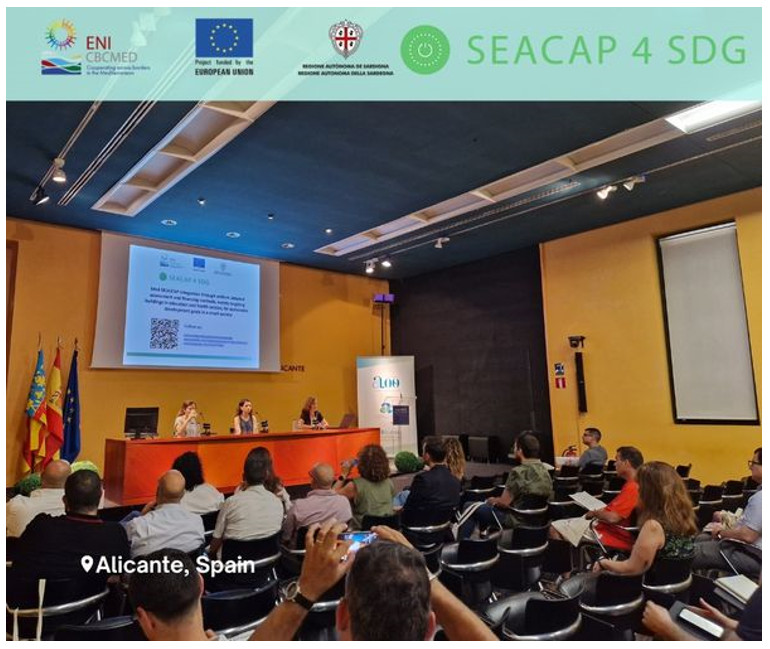
Learn more about the AASTMT Participates in SECAPs Conference here.
AASTMT Joins “Eyes on Earth” Campaign to Promote Climate Action and Forest Preservation on World Environment Day
AASTMT actively participated in the "Eyes on Earth" campaign on World Environment Day, highlighting the critical role of forests in mitigating climate change. Through public activities such as forest preservation events and educational outreach, AASTMT demonstrated its commitment to sharing its Climate Action Plan with local governments and community groups. This initiative emphasized CO2 reduction, sustainable practices, and public engagement in climate resilience, reinforcing AASTMT’s role in fostering collective action for environmental sustainability.

Learn more about Eyes on Earth here.
AASTMT and Empower Hub Celebrate Earth Day with the Climate Leaders Hub Event to Promote Climate Awareness and Sustainable Practices
AASTMT, in collaboration with Empower Hub, celebrated Earth Day through the Climate Leaders Hub Event, which emphasized climate awareness and sustainable practices. This initiative served as a platform to share AASTMT’s Climate Action Plan with local community groups and government representatives, highlighting strategies for reducing CO2 emissions, mitigating climate change risks, and fostering community resilience. By promoting sustainable lifestyles and public participation, the event demonstrated AASTMT's dedication to advancing collective climate action.
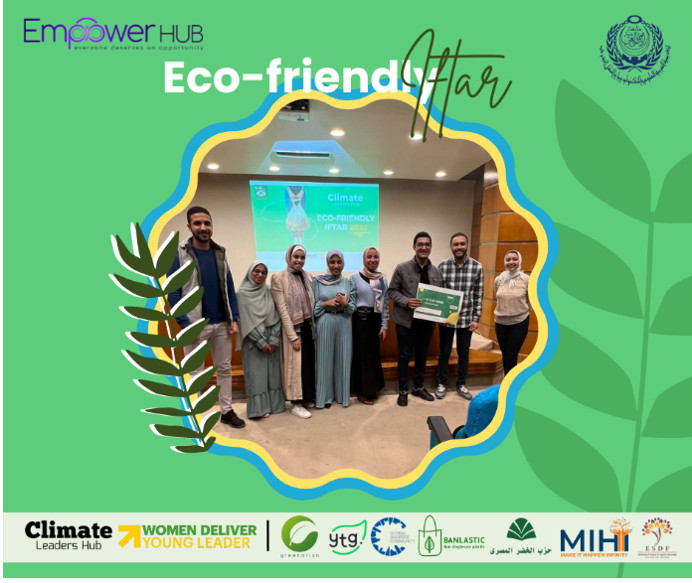
Learn more about Empower Hub event
AASTMT Hosts TuoMali International Conference to Address Marine Waste and Climate Resilience in the Mediterranean
AASTMT hosted the TuoMali International Conference, focusing on addressing marine waste and promoting climate resilience in the Mediterranean. This event aligned with AASTMT’s Climate Action Plan, engaging local governments, community groups, and stakeholders in discussions on reducing greenhouse gas emissions, mitigating climate change impacts, and fostering sustainable practices. The conference highlighted collaborative strategies for marine waste management and emphasized the importance of public participation in climate action initiatives.
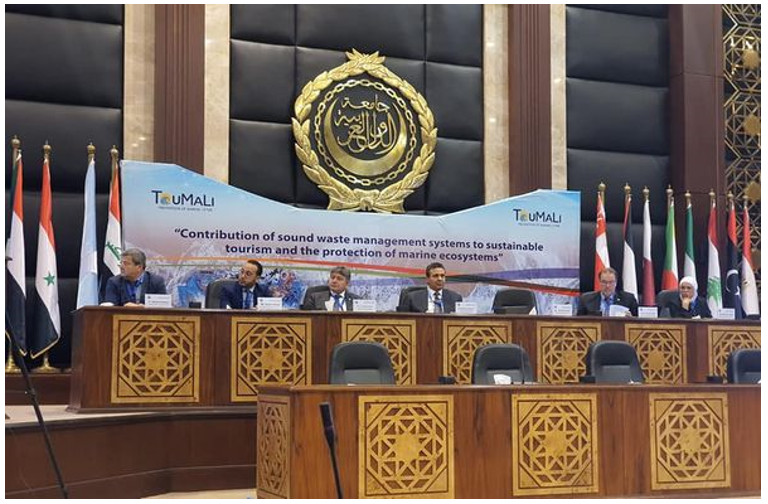
Learn more about TuoMali International Conference here.
AASTMT and Ministry of Planning Launch “Green Egypt Initiative” to Enhance Climate Resilience
AASTMT, in collaboration with the Ministry of Planning, launched the "Green Egypt Initiative" to enhance climate resilience by engaging communities in climate action. This initiative, a key component of AASTMT’s Climate Action Plan, involved planting one million trees across Egypt to promote carbon reduction, mitigate greenhouse gas emissions, and raise public awareness of reforestation’s role in combating climate change. The initiative underscores AASTMT’s commitment to fostering partnerships with local governments and community groups to implement sustainable practices and support climate adaptation efforts.
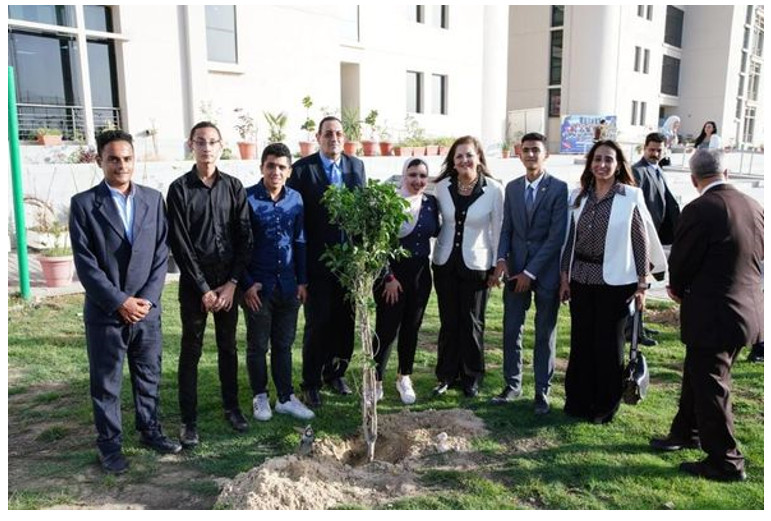
Learn more about Green Egypt Initiative here.
Go Green Workshop
AASTMT’s "Go Green Workshop," held in collaboration with the Egyptian Ministry of Environment, is a significant initiative aligned with its Climate Action Plan. The workshop focused on promoting climate awareness and reducing the carbon footprint through community engagement and education on sustainability practices. Participants explored topics such as plastic use reduction, environmental protection, and strategies for greenhouse gas mitigation. This collaborative effort highlights AASTMT’s commitment to sharing its Climate Action Plan with local government and community groups to foster a collective approach to climate resilience.

Learn more about Go Green Workshop here.
AASTMT Youth Forum 2022 Educates Youth on Climate Risks and Sustainable Innovation
The AASTMT Youth Forum 2022 demonstrated the university's commitment to climate resilience by engaging youth in discussions about climate risks, greenhouse gas emissions, and sustainable innovation. Through interactive sessions, participants explored topics like climate adaptation, mitigation strategies, and the impact of CO2 emissions on global warming. This event aligns with AASTMT's Climate Action Plan by fostering public engagement, particularly among young individuals, and sharing its sustainability goals with community groups and local stakeholders.

Learn more about AASTMT Youth Forum 2022 here.
AASTMT Launches Educational Initiative for Climate Awareness and Sustainable Development:
The AASTMT Educational Initiative for Climate Awareness and Sustainable Development highlights the university's efforts to promote climate action and environmental sustainability through its Climate Action Plan. This initiative focuses on raising awareness about greenhouse gas emissions, CO2 reduction, and sustainable resource use by engaging local communities, government bodies, and stakeholders. By aligning educational activities with its Climate Action Plan, AASTMT ensures that climate change mitigation and adaptation measures are effectively shared and implemented across various sectors.

Learn more about AASTMT Educational Initiative for Climate Awareness and Sustainable Development here.
AASTMT Advocates for Climate Resilience and Sustainability at Mediterranean Ports & Shipping Summit
At the Mediterranean Ports & Shipping Summit, AASTMT advocated for climate resilience and sustainability through discussions aligned with its Climate Action Plan. The event emphasized reducing greenhouse gas emissions, CO2 reduction strategies, and promoting sustainable maritime operations. By engaging with local government and community groups, AASTMT reinforced its commitment to sharing its Climate Action Plan and fostering collaborative approaches to address climate change challenges within the logistics and shipping sectors.
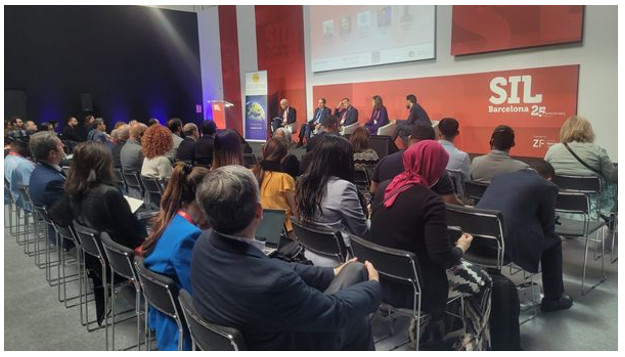
Learn more about Mediterranean Ports & Shipping Summit here.
AASTMT Partners with Ministry of Environment for Climate Action and Waste Management Training Program in Qalyubia
AASTMT, in collaboration with the Ministry of Environment, implemented a Climate Action and Waste Management Training Program in Qalyubia as part of its Climate Action Plan. This initiative engaged local government, community groups, and students in activities promoting CO2 reduction, waste management, and sustainable practices. By fostering community participation and sharing its Climate Action Plan, AASTMT demonstrated its commitment to empowering local communities to tackle climate change challenges collaboratively.

Learn more about AASTMT Partners with Ministry of Environment here.
AASTMT and Ministry of Planning Promote Green Innovation at Annual Startup Forum
AASTMT, in partnership with the Ministry of Planning, actively promoted green innovation at the Annual Startup Forum. This event aligned with AASTMT's Climate Action Plan by encouraging sustainable entrepreneurship and public engagement in climate resilience strategies. Through collaborative efforts, the forum provided a platform for startups to integrate CO2 reduction and sustainable practices into their business models, fostering a community-driven approach to tackling climate change.

Learn more about AASTMT and Ministry of Planning here.
AASTMT Collaborates with Alexandria Government on Coastal Protection and Climate Resilience for World Environment Day
AASTMT collaborated with the Alexandria Government on World Environment Day to address coastal protection and climate resilience, reinforcing its Climate Action Plan. The event engaged local stakeholders in discussions on rising sea levels, greenhouse gas emissions, and sustainable urban planning. This partnership highlighted the shared commitment to climate adaptation and the dissemination of effective strategies for mitigating climate risks, ensuring community involvement in fostering environmental sustainability.

Learn more about AASTMT Collaborates with Alexandria Government here.
AASTMT and Alexandria Governorate Implement Coastal Protection Projects to Strengthen Climate Resilience
AASTMT, in collaboration with the Alexandria Governorate, implemented coastal protection projects aimed at strengthening climate resilience and aligning with its Climate Action Plan. These initiatives addressed critical issues like rising sea levels, carbon footprint reduction, and climate adaptation strategies. By actively involving local authorities and community groups, AASTMT ensured the dissemination of sustainable practices, fostering a collective effort to mitigate climate risks and enhance environmental resilience.

Learn more about AASTMT Collaborates with Alexandria Government here.
AASTMT and Egyptian Universities Join Forces to Empower Youth in Climate Change Mitigation
AASTMT, in collaboration with Egyptian universities, hosted a workshop under its Climate Action Plan to empower youth in climate change mitigation. This initiative involved academic leaders and community groups to enhance public engagement in reducing CO2 emissions and promoting climate resilience. By integrating discussions on global climate warming challenges, greenhouse gas mitigation strategies, and the outcomes of COP conferences, the program strengthened regional cooperation and youth participation in sustainable development efforts.

2021 -2022
The Arab Academy for Science, Technology & Maritime Transport (AASTMT) has diligently implemented Indicator 13.3.2 of the Sustainable Development Goals (SDGs), which focuses on the development and sharing of a comprehensive Climate Action Plan. This plan is a cornerstone of our commitment to SDG 13 - Climate Action, embodying our strategy for combating climate change and its impacts.
Development and Contents of AASTMT's Climate Action Plan:
- AASTMT's Climate Action Plan is a detailed and strategic document that outlines our goals, initiatives, and commitments towards reducing our carbon footprint and enhancing sustainability across all aspects of our operations.
- The plan includes a wide range of measures, from integrating sustainability into our educational programs to adopting energy-efficient technologies and renewable energy sources on our campuses.
- It also focuses on research and innovation in climate science, promoting sustainable practices, and engaging the broader community in our climate action efforts.
Sharing the Plan with Local Government and Community Groups:
- Recognizing the importance of collaboration in achieving climate goals, AASTMT has actively shared its Climate Action Plan with local government bodies and community groups.
- This sharing has taken place through various forums, including official meetings, public seminars, and targeted outreach programs.
- By engaging with local stakeholders, we aim to not only enhance the impact of our initiatives but also encourage a broader adoption of sustainable practices within our community.
Accessibility of the Climate Action Plan:
- To ensure transparency and facilitate wider dissemination, AASTMT's Climate Action Plan is accessible to the public.
- The plan serves as a blueprint for other institutions and organizations aiming to enhance their climate action strategies.
- The full document of AASTMT's Climate Action Plan can be accessed AASTMT-Climate-Action-Plan
Through the development and sharing of our Climate Action Plan, AASTMT reaffirms its dedication to environmental stewardship and its role as a leader in promoting sustainability and climate action. Our goal is to inspire and mobilize collective action towards a more sustainable future, both locally and globally.


